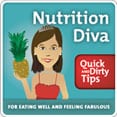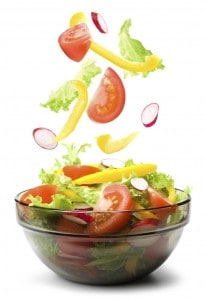In the first installment of this three-part series, I talked about the all-important difference between natural and healthy. People often make the mistake of thinking that something is good for you just because it’s all-natural or organic. Today, I want to explore a different kind of nutritional blind-spot that has to do with quality versus quantity. Even when a food is good for you, it doesn’t necessarily follow that you can eat it in unlimited quantities. Whole grains and fresh fruits are two examples of healthy foods that can easily be over-consumed.
This article is also available as a podcast. Click to listen:
Hold the Line on Whole Grains
You hear an awful lot these days about the benefits of whole grains. People who replace refined grain products like white bread with whole grain products like whole wheat bread have lower rates of heart disease, cancer, diabetes, obesity, and many other diseases. But a lot of people have misunderstood this to mean that whole grains are like vegetables—the more, the better!
I have friends, for example, who wouldn’t be caught dead eating a forkful of white rice—after all, they’re watching their waistlines! Yet they see nothing wrong with eating two or three cups of brown rice with dinner—and can’t imagine why they struggle with their weight.
Whole grains are definitely better for you than refined grains. But that doesn’t mean that portion sizes don’t matter. Despite being higher in fiber and certain nutrients, whole-grain foods are primarily starch. They provide a lot of calories and relatively little nutritional value. And although whole-grain foods are a little easier on your blood sugar than refined grain foods, they still have a moderate to high glycemic impact.
When it comes to grains, you need to pay attention to quality and quantity. In fact, when it comes right down to it, quantity may even be more important. I’d actually rather see you have an appropriately-sized serving of white pasta than an over-sized serving of whole grain pasta. Best of all, of course, would be an appropriately-sized serving of whole grain pasta.
Fruit: How Sweet It Is!
Fruit also has a place in a healthy diet—but, again, more is not necessarily better. Fruits and vegetables both provide important antioxidants, phytonutrients, fiber, fluids—nutrients that protect and enhance your health. However, compared with vegetables, fruits tend to be significantly higher in sugar and calories.
I think people often rationalize that the sugar or calories in fruit doesn’t really “count” because it’s coming from a healthy source. After all, fruit is a food we’re supposed to be eating, right? And when we talk about limited your added sugar, you don’t have to include fruit in that total. But that’s not a license to eat a pound of raisins at your desk every afternoon.
Fruit is both yummy and good for you. And you’re much better off satisfying your sweet tooth with a piece of fruit than a candy bar. But to keep your diet balanced and your sugar intake within bounds, I suggest limiting fruit to two to four servings a day—and no more than one of those should be in the form of juice.
In the next and final installment in this special three-part series, I’ll have one more tip on how to avoid the biggest nutritional traps.
This article was originally published at QuickandDirtyTips.com




